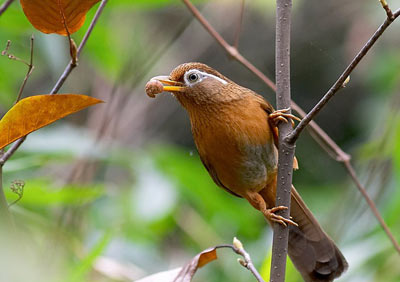Starting from January 1 of next year, citizens who buy thrushes will be fined up to ten times the normal price they usually pay for the birds.
A song bird
The Beijing Municipal Bureau of Landscape and Forestry issued on December 17 a new list of wild animals enjoying municipal protection. Fifty-seven kinds of animals for the first time are included in the list, including pet birds such as thrushes and mynahs.
In March 1989, 168 animal species were included on the protection list issued by the municipal government. This is the first time the government has adjusted the list in 18 years.
Seven non-local birds found in Beijing are now on the protection list.
Gao Shiwu, assistant inspector of the bureau, said that keeping birds is an old Beijing tradition. But some birds inevitably escape from their cages and have had a negative impact on Beijing's ecological environment. For instance, mynahs can now successfully survive through Beijing's winters and they are now endangering the existence of local sparrows. Using this regulation, the government wants to strengthen wild bird management to maintain ecological balance.
Wang Minzhong, Director of the Beijing Wild Animals Protection Center, said that citizens who currently own these birds can still keep them. They can also hand them in to the wild animal protection agencies if they don't want to raise them. But they are not allowed to trade these birds. Heavy fines will be levied if they break the rules.
Kong Lingshui who takes charge of forestry inspection in Beijing, said that anyone who illegally hunts, transports, relegates, sells or purchases thrushes and/or mynahs will be fined one to ten times the bird's usual price. The fine is determined according to the bird's distribution in Beijing and its ecological value in nature, as well as its trading price in the market.
According to Kong, Beijing now has more than 20 illegal wild animal trading places involving 31 species and about 1000 animals. Harsh inspections will be conducted in these places soon.
Vanishing of bird culture?
Mr. Yu has been keeping birds for most of his life. He feels that wild birds are the "super stars" of bird culture.
Yu remarked that some Beijingers use their bird hobby to make money: they tame birds and then sell them but some people keep birds just for fun.
Yu admitted that many wild birds are sacrificed while being tamed. The odds of successfully taming a bird are about ten to one. But Chinese people like pet birds. Yu said, "It is part of our traditional culture to keep birds because they provide a great amount of knowledge as well as entertainment." Yu said that he was worried Chinese bird culture would gradually vanish since fewer and fewer people will now buy the birds due to the trading prohibition.
One tamed bird is equivalent to ten deaths among wild birds. Kong Lingshui explained that a hidden industry exists behind every tamed bird. Specialists hunt, tame, transport and sell wild birds. Many die along the business chain: hunting causes casualties; disagreeable birds are eliminated during taming; birds are also likely to die during transportation and trading.
Kong said that they would take serious measures to combat illegal trading of these wild animals in order to prevent widespread destruction of species resources.
A mynah
(China.org.cn by Li Xiaohua, December 19, 2007)







